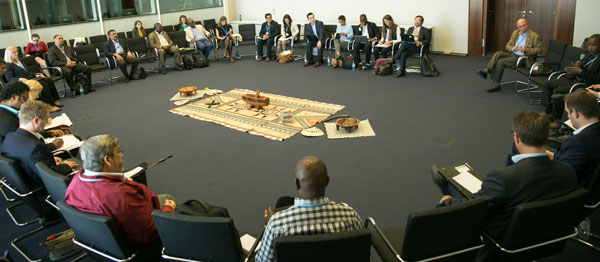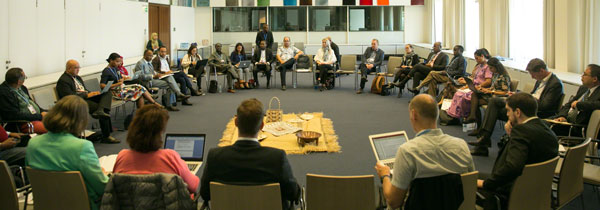BIC/IEF Contributions to Talanoa Dialogue
Bonn, Germany, 6 May 2018
The Fijian presidency of COP23 under the UN Framework Convention on Climate Change launched the Talanoa Dialogue, named for a Fijian tradition of trust building through story telling, to prepare governments for increasing ambition in their greenhouse gas reductions before COP24. The International Environment Forum submitted a first written contribution in March 2018: https://iefworld.org/Talanoa1. Face-to-face dialogues were then organized at the Bonn Climate Change Conference on 6 May 2018, with seven dialogues in circles each consisting of 30 state party representatives, with 5 representatives of other stakeholders in rotation each addressing one of three questions: Where are we? Where do we want to go? How do we get there?. Each participant was given 3 minutes to tell a story, and could then take part in the following discussion. The stories were intended to be positive and encouraging, inspiring others to increase their ambition. The Talanoa Dialogue brought an example of constructive consultation sharing a diversity of perspectives and experience in support of a formal diplomatic negotiating process. Two IEF members participated in these dialogues.

Photo by
IISD/ENB | Kiara Worth
The Bahá'í International Community, represented in the UNFCCC by the National Spiritual Assembly of the Bahá'ís of the United States, in partnership with the IEF, was accepted to participate in one of the dialogues on the question "How do we get there?" with IEF President Arthur Dahl as the representative. The following is the story shared in the dialogue in Bonn.
My story is about faith-based organizations in the Bahá'í International Community, represented in the UNFCCC by the Bahá'ís of the United States, that are working around the world to build resilient communities and stimulate social action at the grassroots.
The International Environment Forum is a Bahá'í-inspired professional organization with members in over 70 countries including Fiji. Our members have worked for a decade developing educational materials on climate change and community resilience that incorporate interfaith, intercultural and indigenous perspectives, and empower local involvement and action. These are implemented on line, in local communities and, for example, in a national programme in Vanuatu. This experience could easily be replicated.
In many countries, political leaders do not want to get too far ahead of public opinion, and will only raise their ambitions if they know that they have public understanding and support. Informing the public about the science of climate change is not sufficient to change attitudes or behaviour if it is not coupled with messages with ethical, moral or spiritual content that trigger an emotional involvement and motivation to change. This requires public education that reaches wider constituencies beyond those already concerned about climate change.
Religious communities and their faith-based organizations are already heavily involved in education, and can spread climate messages linked to their spiritual teachings, as in the Pope's Encyclical, the Islamic Declaration on Climate Change, and Bahá'í International Community statements on the topic. Indigenous communities, with deeply-held values and concern about climate change affecting their future, can also be assisted to share relevant climate messages.
Governments and the UNFCCC can identify such potential additional partners in public education about climate change and the need for action. These organizations and communities have strong ethical frameworks and public trust. They may need assistance to understand the science of climate change in culturally relevant ways, so that they can relate this to their own values and develop educational programmes to build motivation for change in individual lifestyles and consumption patterns, in support of government ambition. Our Bahá'í experience can serve as a model for similar action in other communities and countries.
We encourage governments to partner with the many faith-based, civil society and indigenous groups in their country to expand educational outreach on climate change, combining science and ethics, to build wide support for their enhanced commitments under the Paris Agreement.
IEF RESOURCES on climate change education referred to in the story
Courses on the Scientific and Spiritual Dimensions of Climate change
- English: https://iefworld.org/ssdcc0.html
- French: https://iefworld.org/ccFr0
- Spanish: https://iefworld.org/fl/ccSp.pdf
Climate Change Disaster Risk Reduction in Vanuatu (case study): https://iefworld.org/elcvanuatucc
IEF Contributions to COP21 on community resilience, accountability and education: https://iefworld.org/cop21

Photo by
IISD/ENB | Kiara Worth
IEF governing board member Sylvia Karlsson-Vinkhuyzen also participated in the Talanoa Dialogue representing Wageningen University where she teaches. She was in a circle addressing the question "Where are we?". She has a particular interest in the effectiveness of intergovernmental processes and holding governments accountable for what they agree to. The following is her story.
This is the story of a species with a unique capacity for science and morality that inhabits a beautiful blue planet. As a result of a tumultuous history its members are divided into some 200 countries. These countries are finding more and more reasons to unite to address common challenges. The changing climate is one example. After many years of struggle they agreed on an accord with a common objective. Joy and celebrations! In this accord countries accepted to do their very best to address climate change. As was their habit – however – they did not want to prescribe how much each country should do.
So to make sure that the total contributions are sufficient to reach their common objective they created a mechanism of global reflection on past action every five years. Each country then has to consider the outcome of this when deciding how much they will do next. This is a collective accountability mechanism. Accountability can be defined as being about telling a story, based on some obligation and with some consequences.
We are now in a trial run of this mechanism. This we know. But we do not know how obligatory story telling at global level can have sufficient national consequences. We can develop two sets of questions to find out.
First, how do we tell our stories and reflect on them at the global level?
• How do we create an environment of amity and trust for sharing stories of both failure and success for mutual learning?
• How earnest and uplifting can we make our collective deliberations based on these stories?
Second, how do we bring the global reflection home to our countries?
• How open and timely are our national climate planning cycles to consider the outcome of the global reflection?
• How much do parliamentarians and other domestic actors support considering national responsibilities in light of a global perspective? And how can these actors hold the government to account for its climate policy?
Even more relevant is: how do we hold ourselves to account? Do we regularly look ourselves in the mirror, reflect on our own actions and compare those to our ethical standards? And if we find a mismatch do we strengthen our pledge to do our best to support the Paris Agreement?
Finally, do we go home from here and have uplifting and meaningful conversations with our family members, co-workers, friends and strangers to accompany others towards such self-reflection? Then we can say this process is about facilitative accountability.
The Fiji-inspired Talanoa Dialogue is quite close to the Bahá'í concept of consultation in a constructive spirit of sharing diverse experiences in support of decision-making, explicitly asking for respectful and constructive interactions, building empathy and trust as the objective and avoiding naming and shaming. In a reflection session on the Dialogue on 8 May all countries expressed appreciation for the approach and several pointed out how it added emotional aspects and values as important. As one delegate said: "We went into the dialogue knowing and came out understanding." Some governments made proposals to continue the Talanoa Dialogue process beyond COP24, but in this year there is strong encouragement to organize Talanoa Dialogues at national and local levels. You all might explore if there are opportunities where you are to participate.

Last updated 9 May 2018
